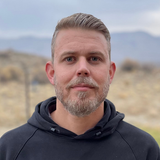What Can I Do About Anxiety?

Recently a verse came to my mind. Psalm 43:5. It sums up my feelings lately. I feel cast down. Like a man charging windmills, I fight at nothing and everything. There is a fog between me and the world. I am anxious. Admittance is key to getting help but I would rather stay in denial because I am afraid this creeping doubt comes from a weak faith and a poor eternal perspective.
“Why are you cast down, O my soul, and why are you in turmoil within me?…”
The song “I Know” by Big Daddy Weave has been playing in my headphones and truck quite a bit. The song terrifies me and comforts me simultaneously. This is not a “follow Christ and all will be well” kind of song. This song explores what it means to walk through the valley of Death and pain and deep sorrow and come out singing praise to a good God. But there is this part of me that just wants the prosperity and not the depth.
So what do I do with anxiety? As a Christ-follower how do I square my humanity with the commands to emulate the divine? Absolute perfection may not be ours to possess this side of eternity, but the pursuit certainly is.
“Be anxious for nothing…” These are Christ’s words. These are not just words, but a command. It is a direct admonition to NOT fear. The Scripture is laced with admonitions not to fear. This fact must be why the Psalms give so much comfort to people. It speaks to our humanity. There are times in the Psalms where David’s fear is palpable. It is as if you can taste the metallic, coppery coating on the tongue and smell the scent of adrenaline-fueled fear. From my perspective, he had every reason to fear. He was hunted like an animal without cause and by his father-in-law. From what I can see, David didn’t indulge his fears or dwell on them. He didn’t glorify his anxiety or create a sort of twisted martyrdom of it.
David discovered something in his anxiety and fear. He had to make a decision, a pre-emptive choice that was counterintuitive to the fight or flight instinct. David chose to trust in a God he had proven over and over again. He trusted before he saw his salvation.
The second part of Psalm 43:5 says:“…Hope in God; for I shall again praise him, my salvation and my God.”
I looked up the breakdown of the Hebrew translation for “I shall again praise”. David was practicing habitual gratitude. This was an ongoing decision, not just a season, but a daily habit. Research tells us that it is difficult for the brain to focus on negative and positive thoughts simultaneously. Some research seems to show that practiced gratitude helps to reduce anxiety and can have long-term positive effects on both mental and physical health. Psalm 43:5 provides both a glimpse into a Biblical hero’s humanity and practical advice for combatting anxiety.
In all of this, I found myself caught in a cycle of negative thoughts and anxiety. It was about 4:45 AM, the road was dark, the glow of my headlights barely cutting a swath through the pre-dawn as I wound up the slope from the Snake River on my daily commute. Just me and God. I wasn’t praying, I was complaining in my mind. I listed all the things I would rather be doing, owning, experiencing, etc. The Holy Spirit must have stopped me short because before I had put any of these thoughts down, I began to look at the flip side and list all the positive things about what I am doing, owning, experiencing, etc. It turned from negative, anxious thoughts to prayers of praise and thanks to a good God who cares about every little detail of my life.
For many people, this is a season of anxiety. Things we thought were foundational and secure have fallen away. So much of our daily life has been upended and we may find ourselves at the end of the day (or like me in the beginning) asking “why?” and “what is it all for?”If you find yourself in this negative cycle, start thanking God for every positive aspect of the situation you were dwelling on and praise Him for it.





